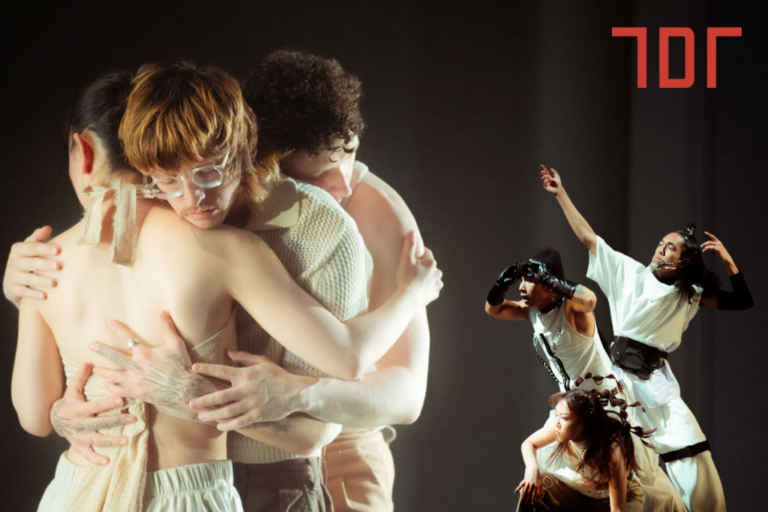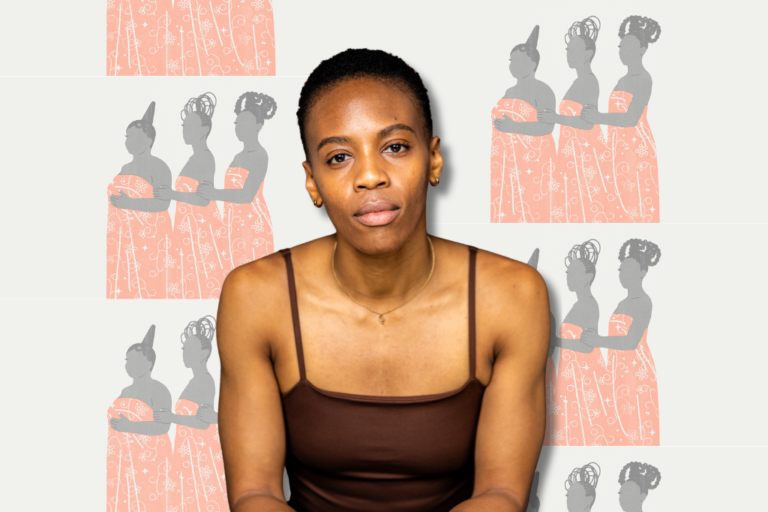In Caw-nversation with Crow’s Theatre’s Chris Abraham and Sherrie Johnson
Glossy season announcements, airtight COVID-19 protocols, and hybrid programming, oh my! Crow’s Theatre is back (Cliff Cardinal’s radical As You Like It opened just last yesterday, and announced a one-week extension through October 17) to captivate Toronto audiences with an innovative roster of plays and performances to fill the next several months.
We sat down — over Zoom, of course — with Artistic Director Chris Abraham and Executive Director Sherrie Johnson to chat all things Crow’s: where the company’s been, where it is now, and where it’s heading as the world makes sense of yet another new normal.
“So: how’s COVID been?,” I start, a little glibly. I sort of know the answer: COVID hasn’t necessarily been great for anyone in Toronto theatre.
“It’s a hard question to answer,” starts Abraham. “It feels like a complete blur — the undifferentiated time sitting at the same desk at home for eighteen months — it’s hard to remember all the different phases of the pandemic.”
“But we’ve been doing a lot. The last year was a big year, a big digital pivot for the company, same as for many companies. But we did it a little bit differently, and we were lucky to be able to invest in some digital infrastructure at Crow’s. You’ll see the results of that over the next year.”
Abraham describes Crow’s relationship with digital performance over the past year-and-a-half: there’s been open calls for theatre-identifying creators, for instance, with specific aims of providing theatre creators the tools to pivot their craft to digital media. Crow’s launched a stage-to-screen retreat, as well, in partnership with Mongrel Media, with a goal of “taking seriously the notion that [Crow’s] needed to think even more broadly about the future of theatre creators.”
Crow’s needed to think even more broadly about the future of theatre creators.
Johnson chimes in with another unexpected and extremely successful product of the last year: “Don’t forget! We created a signature event, Dinner and a Show, which inspired people across the country to follow suit.” The experience paired a digital performance with a cooking-and-plating experience for patrons — audiences had the chance to enjoy a meal from local restaurant Gare de l’Est in the comfort of their own homes while enjoying digital theatre.
We pivot (for those playing COVID arts journalism lingo bingo at home, that one’s for you!) from looking backwards to looking forwards: I ask Abraham and Johnson about the upcoming season, an exciting one after so long away from in-person theatre.
“What do you think Canadian theatre needs right now, and how does this season react to those needs?,” I ask, curious about the curational through-line of the announced lineup.
“The team,” says Johnson, “worked very hard to address and read through the [over 200] submissions sent our way over the past year. That’s a lot of projects,” she laughs.
Abraham joins in. “A lot of this is work that feels like it’s ready to meet the public, either in a finished production or in this new salon series where we invite audiences to be a part of new works in development. That’s something Sherrie and I, throughout our careers, have cared about — that work in development.”
He continues, “The thing that, curatorially, was on our minds: we wanted to find the voices that address the now. We were also interested in prioritizing and centering representation of voices that are not represented equally on our stages.”
We wanted to find the voices that address the now.
“I was looking for optimism. I was looking for hope. Not in a sentimental way; it’s a bracing season in a lot of ways — it grapples with conflict, polarization, big human problems. But I was looking for ideas about how we go forward. These works make bold propositions around the next steps that we take together.”
Abraham takes a moment to reflect on the power of live theatre, revealing a nostalgia and reverence for the craft that feels relatable; a little sad; hopeful.
“The fact that we’ll be coming back together in a room — theatre has this power. You can be in the theatre, you can be yourself, you can pick your own thoughts and have your own feelings. You don’t have to agree with everyone around you. But the fact that you feel those things, your own thoughts and feelings, with other people — something really powerful happens in that moment.”
“It’s not about creating conditions in which you’re cajoled into thinking like everyone else. But it has this social cohesion that I’ve really been missing. And I think that’s a big part of how we take steps forward.”
Johnson adds, speaking to the structure of Crow’s upcoming season, that “one of the things that was really important in putting this season together was to double down: to put as many artists back to work as possible. In addition to all this great programming, we’ve also launched Crowsnest Corner to put musicians back to work, as well.”
“Artists, musicians, the hospitality sector: anything we could do to be a good partner, a good neighbour, a good friend, to help us all get through this, was really key to a lot of our decisions this year.”
We’re doing anything we can do to be a good partner, a good neighbour, a good friend, to help us all get through this.
And part of being a good neighbour, particularly as a major theatre company: offering discounted tickets to the community members who need them most. Crow’s is offering discounted tickets to arts workers and everyone under the age of thirty, as well as Pay-What-You-Can performances on Sundays. Abraham believes that’s a vital part of running a theatre company.
“That Sunday matinee, that Pay-What-You-Can performance — it’s a ritual. We grew up in the theatre, and that’s how we were able to afford going to the theatre on a weekly basis and nurture our theatre habits.”
“We’ve also created this digital subscription,” adds Johnson, “for those who might not feel safe coming back to the theatre yet. So people will still be able to see the shows digitally — they’ll have the choice to watch from the comfort of their chosen place.”
As the conversation reaches its bittersweet conclusion (I could talk about this season for hours, seriously) and I ask for final reflections on the re-opening of Crow’s, Abraham smiles.
“Work didn’t necessarily get easier this year. Work got harder for everyone. We’re doing this so we can have some return — communication with the public. We’ve spent the last year navigating interruption, and that made the work harder. The whole team really depends on, and is fed by, that ecosystem of collaboration and passing on what we do to the public. That’s essential for arts organizations. It was unexpectedly hard to have that ecosystem interrupted.”
I joke that there’s only so much of that collaborative energy you can put in a Slack channel, and Abraham and Johnson smirk: something tells me the Crow’s team has become well acquainted with the team-building capabilities of emojis and quick DMs over the past year.
This work is about pleasure.
“This work is about pleasure,” concludes Abraham. “It’s always been about pleasure. Everything onstage this season is about pleasure — the most ambitious form of pleasure, the pleasure of coalescing some hopefulness around understanding each other. A lot of the season is about that.”
And those pleasures untold are what we’re excited to discover this season at Crow’s. You can read more about Chris Abraham, Sherrie Johnson, and Crow’s Theatre here.















Comments